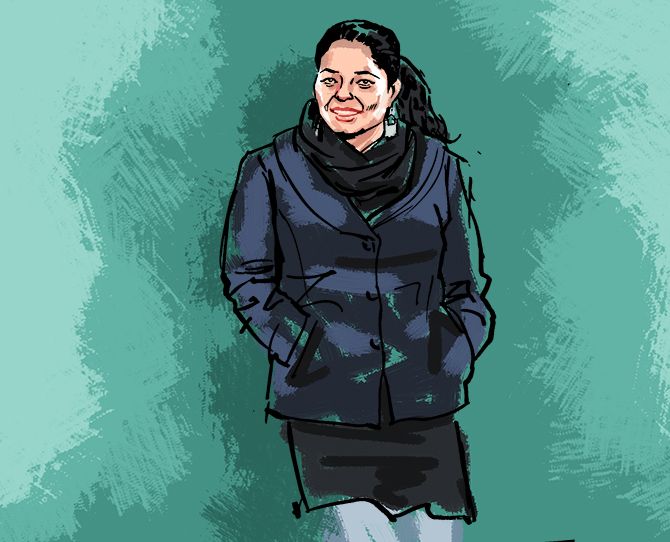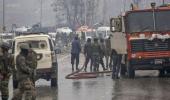'I have only seen conflict since I was born. I want it to stop. I am longing for peace,' a young Kashmiri woman in Delhi tells Rediff.com's Archana Masih.

The only Kashmiri student of the batch, Aafreen Sadiq*, did not go to the institute where she is learning cinematography in Delhi, for three days.
Her parents called her from Srinagar and told her to stay indoors after hearing about Kashmiri students being threatened and attacked in different parts of India after a Jaish-e-Mohammad suicide bomber killed 41 CRPF personnel in Pulwana.
"I asked them, 'Why? I haven't done anything. This is not my fault, why should I not go to college?'"
"My parents said, 'You haven't done anything, but people might not listen to you'."
"When the incident happened, I was in college and everyone started asking me questions. I said, 'How do I know what happened? I am a Kashmiri that doesn't mean that I am involved."
On Tuesday, Aafreen, a graduate from Kashmir University, did not make the customary morning call to her mother because she did not want her parents to know that she was resuming college.
"It is not about Hindu-Muslim; Kashmir-India. A particular group is involved and they are blaming the entire community, the whole of Kashmir and the Kashmiri people?" questions the 22 year old who lives with a friend's family in the nation's capital after she got admission 6 months ago.
How the Kashmiri Muslim became friends with a Hindu girl from Delhi is a beautiful happenstance that is testimony to the organic ethos of India -- that has brought Indians of different faith together and bound them into friendships which then go on to embrace the families of two individuals into that wondrous circle of fellowship.
That is what happened with these two friends too. They met in Kargil two years ago at an international youth festival with participants from all over the country. The girls hit it off, and when Aafreen got an interview call for a course in cinematography in Delhi, her friend's mother called Aafreen's mom, and told her that there was no way she was going to stay in Kashmir House or a hotel.
'Jab ghar hai yahan, kahin aur kyon rahegi? (When there is a house here, why she should stay anywhere else?' said the mother of one young girl to another -- removed in faith and geography, but united in that common space which is a mother's heart.
After she secured admission, her friend's family offered that she continue to live in their home. They did not ask for a single rupee as rent.
"She is the first girl from our family to step out of Kashmir for an education. I was worried that if boys were being attacked, what if they raise a hand against a girl?" asks Aafreen's mother after the worrying news of attacks on Kashmiri students.
"This family is too nice, aunty treats me like her daughter," gushes Aafreen -- but there are some in the neighbourhood who display prejudice.
A "neighbour aunty" came to her and asked if Kashmiri boys from a young age were told to join terrorism.
"I told her what answer can I give you aunty? They didn't ask me if they should join militancy. They did not even ask their parents. They don't ask for permission."
"In college students were asking me about the suicide bomber. It is very embarrassing. I felt a little nervous and unsafe."
That night, when she went to the market, there were people burning posters and asking for revenge. Her friend hurried her home, saying what if they found out she was Kashmiri.
"On the news, Kashmiris were being called anti-national. 'Throw them out', they said, and I thought there was also a Muslim from Rajouri, J&K, among the CRPF personnel who died in the attack."
"Was any Hindu blamed for the Naxal attack of 2010 (that took the lives of 76 CRPF troopers)? Then how can they blame all Muslims? They too are a part of this country," Aafreen points out.
As candles were being lit in memory of the martyrs, Aafreen also lit one in her window. Not for show, she says, but because she was pained that 41 men had been killed.
"If Kashmiri children are hit by pellets, I feel the pain. I felt the pain when I came to know 40 army men have been killed."
"In this India-Pakistan-Kashmir conflict -- who is suffering? The local," she says and rues the absence of Kashmiri leadership.
The problem as perceived by her is that Kashmiri youth does not have a platform to express themselves.
"There is a communication gap between them and whosoever is on the other side. No one wants to hear the Kashmiri youth," she says, expressing disappointment that during his last visit to Srinagar, the prime minister did not make an effort to meet Kashmiri youth.
Instead, a curfew was imposed and Internet was suspended.
In Delhi's highly surcharged political environment, even prior to the CRPF carnage, batch-mates often ask her about stone pelters, and called them anti-nationals.
"My classmates have never been to Kashmir. I invite them, not as tourists, but as guests in my home so that they can get a sense of how caged one can feel when there is no Internet and there is curfew," says Aafreen, adding that in 2016, they were under virtual house arrest for 6 weeks without access to the Internet.
With the desire to work for the Discovery Channel one day, Aafreen is part of an NGO that works for peace which helps organise workshops in Delhi, Jammu and Chandigarh.
"I don't believe in religion. I believe in the religion of humanity."
In the last half year, she has grown to like Delhi, especially the opportunities it provides in meeting new people.
"And I like that there are no restrictions," she laughs. Especially, a non stop Internet connection.
As for her hometown, there is only one wish.
"I have only seen conflict since I was born. I want it to stop. I am longing for peace."
*Her name has been changed so that she does not encounter any problems in these surcharged times.











 © 2025
© 2025